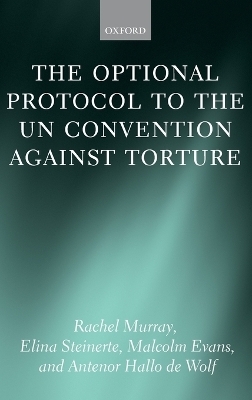
The Optional Protocol to the UN Convention Against Torture
Oxford University Press (Verlag)
978-0-19-960219-3 (ISBN)
The Optional Protocol to the UN Convention Against Torture (OPCAT) establishes an independent international monitoring committee (SPT) which itself will visit states and places where persons are deprived of their liberty. It also requires states to set up independent national bodies to visit places of detention. This book, drawing upon events held and interviews with governments, civil society, members of UN treaty bodies, national visiting bodies and others, identifies key factors that have shaped the operation of these visiting bodies since OPCAT came into force in 2006. It looks in detail at the background to the adoption of the Protocol, as well as how the international committee, the SPT, has carried out its mandate in its first few years. It examines the range of places of detention that could be visited by these bodies, and the expectations placed on the national visiting bodies themselves.
The book also places the OPCAT within the broader system of torture prevention in the UN and elsewhere and identifies a range of trends arising from the different geographical regions. As well as providing an insight into its work, this detailed examination of OPCAT also provides valuable lessons for other new human rights treaties such as the UN Convention on the Rights of Persons with Disabilities and the Convention on Enforced Disappearances, which have similar provisions concerning national mechanisms.
Rachel Murray is Professor of International Human Rights Law at the University of Bristol and Director of its Human Rights Implementation Centre. Dr Elina Steinerte is a Research Associate at the Human Rights Implementation Centre of the University of Bristol. Professor Malcolm Evans is Professor of International Law at the University of Bristol. Antenor Hallo de Wolf is based at the University of Groningen.
1. The origins and development of OPCAT ; 2. Drafting of OPCAT: Towards deadlock 1991-2000 ; 3. The text of OPCAT ; 4. The Scope of OPCAT ; 5. The Role of the SPT ; 6. The Role of NPMs ; 7. OPCAT within the Broader UN and Regional System ; 8. Regional Trends towards Ratification and Implementation of OPCAT ; 9. Conclusion: Emerging Trends and the Future of OPCAT ; Appendix I: OPCAT ; Appendix II: Rules of Procedure of the Subcommittee on Prevention of Torture ; Appendix III: Guidelines of the Subcommittee on Prevention of Torture and Other Cruel, Inhuman or Degrading Treatment or Punishment in relation to visits to States parties ; Appendix IV: Preliminary Guidelines on NPMs ; Appendix V: Guidelines on National Preventive Mechanisms ; Appendix VI: The approach of the Subcommittee on Prevention of Torture to the concept of prevention of torture and other cruel, inhuman or degrading treatment or punishment under the Optional Protocol to the Convention against Torture and Other Cruel, Inhuman or Degrading Treatment or Punishment ; Appendix VII: Members of the SPT as at January 2011 ; Appendix VIII: Chronology of States visited by the SPT
| Erscheint lt. Verlag | 11.8.2011 |
|---|---|
| Verlagsort | Oxford |
| Sprache | englisch |
| Maße | 165 x 240 mm |
| Gewicht | 553 g |
| Themenwelt | Recht / Steuern ► EU / Internationales Recht |
| Recht / Steuern ► Öffentliches Recht ► Völkerrecht | |
| Sozialwissenschaften ► Politik / Verwaltung ► Europäische / Internationale Politik | |
| ISBN-10 | 0-19-960219-0 / 0199602190 |
| ISBN-13 | 978-0-19-960219-3 / 9780199602193 |
| Zustand | Neuware |
| Haben Sie eine Frage zum Produkt? |
aus dem Bereich


